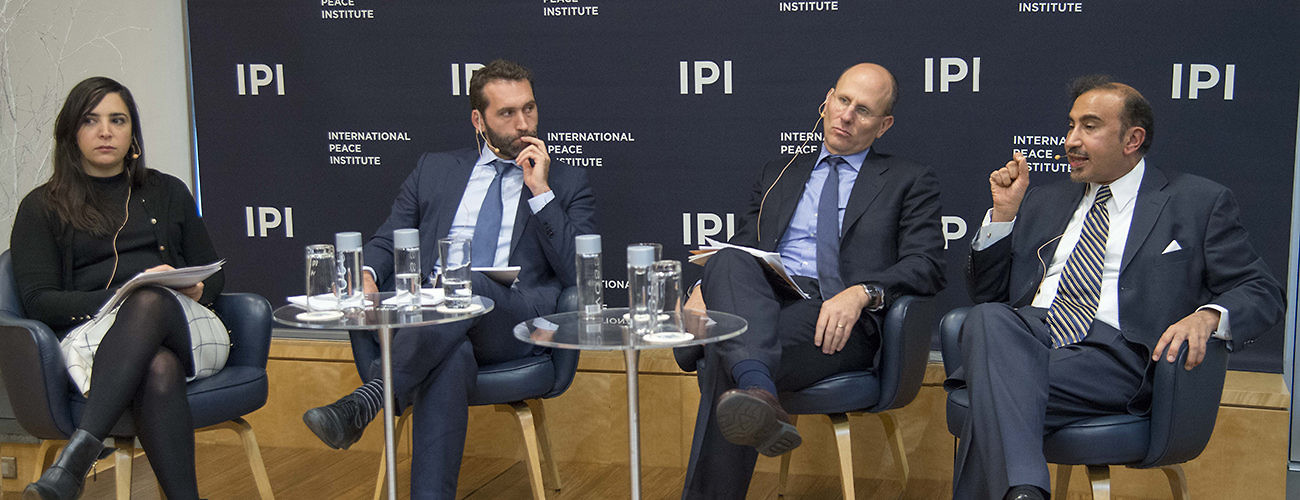Preventing Violent Extremism (PVE) got an important boost from Secretary-General Ban Ki-moon but will need another with the likelihood of a less supportive government in Washington.
That view was expressed at an IPI policy forum by Eric Rosand, Director of the Prevention Project: Organizing Against Violent Extremism, and a senior counterterrorism official at the US State Department from 2010 to this year.
“The outgoing Secretary-General deserves a lot of credit for globalizing the conversation [about PVE] when he bravely agreed to follow President Obama at the February 2015 CVE summit, promising to develop his own PVE plan of action,” said Mr. Rosand. “As we look at the transition in Washington, to an administration that may not embrace prevention as a priority, having UN leadership on this is going to be more important than ever.”
He added that the Secretary-General’s plan of action has acted as a springboard for collaboration on PVE across the multilateral system, with new projects by the United Nations Educational, Scientific and Cultural Organization (UNESCO), the World Bank, and other UN agencies that would have been unthinkable even two or three years ago.
“The bridge between the security and development community on this is stronger than ever,” he said. “These international institutions are not known for being particularly nimble or responsive to political demands. That positive story does not get enough attention.”
Mr. Rosand listed three UN reforms for a more efficient and cohesive PVE strategy:
Dedication of more sustained resources and funding to PVE
Better coordination between the wide array of stakeholders from law enforcement, civil society, and government sectors
More emphasis on building the power of local groups
Michelle Breslauer, Director of the Americas Program at the Institute for Economics and Peace, emphasized the need for a robust PVE strategy, pointing out that terrorism is one of the driving factors contributing to a sharp decrease in global levels of peace in recent years.
She said that while terrorism is a global phenomenon, its human toll has been highly concentrated. “Five countries are responsible for 72% of terrorism deaths: Iraq, Afghanistan, Nigeria, Pakistan, and Syria,” she said. Four groups are responsible for 74% of deaths: ISIS, Boko Haram, Al Qaeda, and the Taliban.”
In light of this upswing in violent extremism, Ms. Breslauer lamented the lack of political will for prevention, and the subsequent shortage of resources devoted to PVE. “When we compare investments in peacebuilding and peacekeeping to economic costs of this type of violence, we found that economic resources devoted to peacebuilding and peacekeeping represent only 2% of the economic impact of armed conflict and terrorism globally,” she said. “So we’re spending a very small amount on trying to put in place the preventive measures that are needed to establish environments that are free of the risk factors that we are identifying.”
Mr. Rosand framed the issue of the international architecture of peace in terms of how the UN—a system built on interstate cooperation—needs to adapt. The UN needs to take a “communities-first approach” on this issue, he said, even where that means engaging communities that “are often not necessarily on the same side of the equation when it comes to solutions as their national governments,” he explained.
How can a member-state dominated system deal with an issue about “how individual states relate to their own communities and to one another,” he asked. “That’s the conundrum,” he said. “Can the UN system evolve or develop mechanisms, frameworks, programs to allow the state/citizen relationship to mature where a lack of maturation can lead to violent extremism.”
Jehangir Khan, Director of the UN Counter-Terrorism Implementation Task Force, stressed the threat posed by terrorism to the international order, and the United Nations’ moral imperative to develop a prevention strategy. “Violent extremism is a direct assault on the United Nations charter, on the values we hold dear,” he said. “For that reason it’s core to our business.”
However, he said that the UN can lead, but states must adapt the normative PVE framework to their own unique circumstances.
“Ultimately it is the responsibility of national actors, governments, and civil society to develop national plans of action,” he said, “not the UN or others to impose a brand or straight jacket. Each society, each community, each nation knows what’s best for it.”
He concluded, “It’s not the UN that’s going to do it, it’s ultimately national actors.”
Arthur Boutellis, Director of the IPI Brian Urquhart Center for Peace Operations, moderated the discussion.
The event was co-organized by the Prevention Project and the Institute for Economics and Peace.








